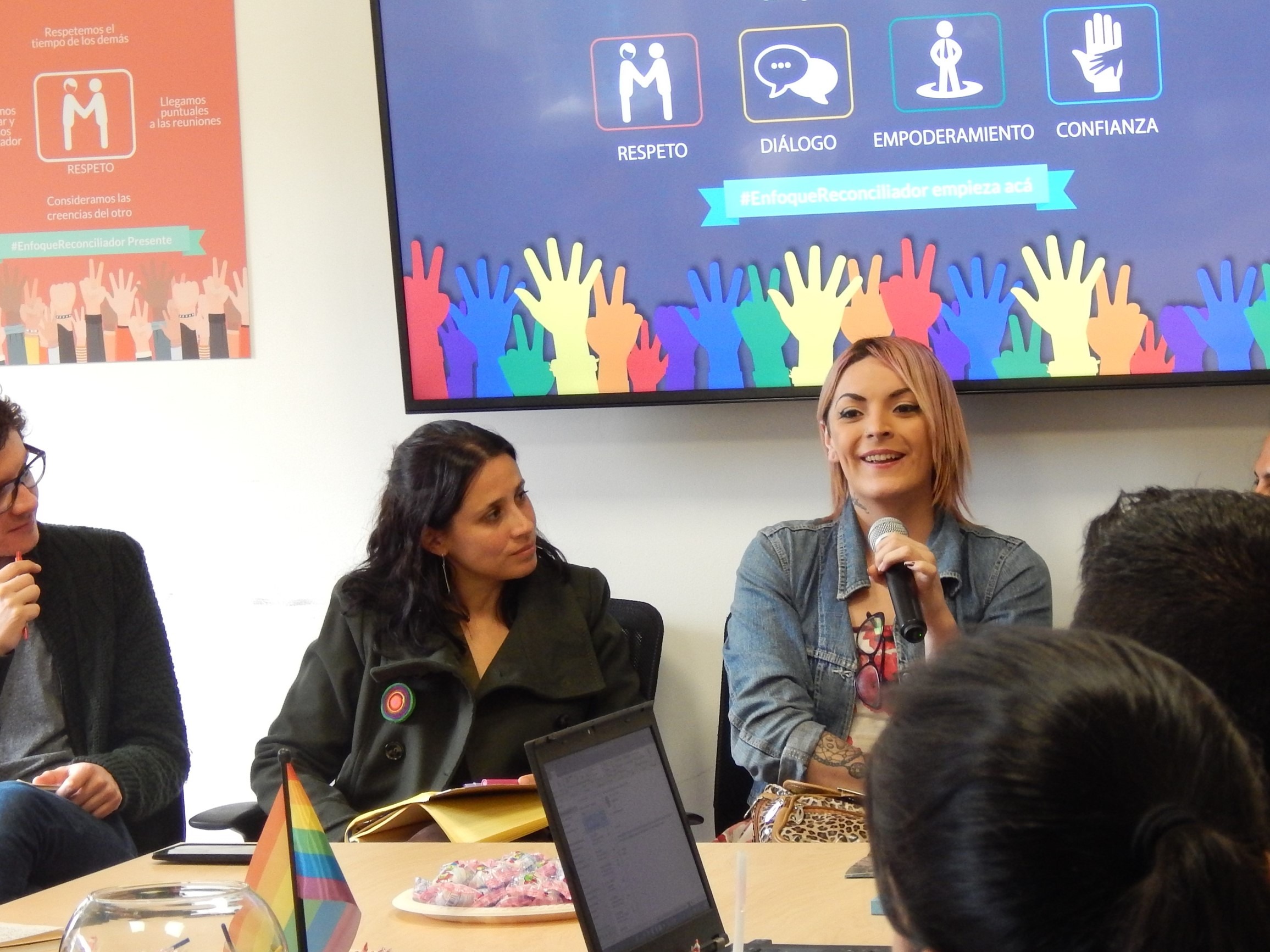
Her rose-printed skirt sways when she walks in the room. She tucks her hair behind her ear. As she tells her story, the audience is hushed and expectant. Ana Sofía (with microphone in photo) recounts how people often ask her, “What’s wrong with your voice?” She responds to them with a giggle, “I caught a bad cold a long time ago and never could shake it off.” Four years ago, Ana Sofía transitioned from being a young man to a young woman.
According to Fundación Grupo de Acción y Apoyo a Personas Trans, transgender issues only entered Colombia’s public discourse in the last 10 years, meaning transgender individuals are frequently the targets of hate crimes, violence, and discrimination.
In 2017, Ana Sofía heard about a job placement program, where she could study for free and secure a stable, paying job. At the age of 29, she had never been able to find employment in the formal market. “People think that the only thing that transgender women are good for is working as a hairdresser or as a prostitute,” Ana Sofía said. Fear, prejudice, and severe stigmas force many transgender individuals into sex work.
Ana Sofía remembers being terrified the first day she stepped into the Gente Estratégica training center to begin workforce development courses. “I thought I would get nasty looks and horrible remarks from my classmates,” she said. To her surprise, her first day unfolded without any problems. “None of my teachers treated me any differently than my other classmates,” Ana Sofía said. “Obviously, people stared at me, and some girls asked me ‘What are you?’ And I just responded, ‘I’m a woman.’”
“I don’t make friends with people who will bring me down because I’m going up. I want to be somebody in this world.”
— Ana Sofía, a Program of Alliances for Reconciliation participant
During the first three months of training at Gente Estratégica, Ana Sofía learned about customer service, effective communication, and basic computer programs. She also took part in daily soft skills courses, where she learned about assertive communication and workplace etiquette. In alliance with the Colombian government entity Prosperidad Social, the Program of Alliances for Reconciliation (PAR), funded by USAID and implemented by ACDI/VOCA, partnered with Gente Estratégica to foster respect, trust, dialogue, and empowerment among the center’s youth. PAR worked with the center’s teachers and psychologists to address bullying, gender inequality, and nonviolent conflict resolution. PAR also presented ACDI/VOCA’s proprietary Decido Ser toolkit, made up of various resources for promoting peaceful reconciliation.
For the first time in her life, Ana Sofía began earning a stable income through a paid internship at Atento, one of the country’s largest business process outsourcing companies. She was the first transgender person to work at the company in Colombia and fully aware of the enormous responsibility that came with it. Ana Sofía passed her training tests with nearly perfect scores, and her supervisors reported that her work quality was outstanding. She handled the groundbreaking new role with confidence and paved the way for others to follow.
In case you missed it, check out the full Pride Month blog series:
- Why the Inclusion of LGBTQ+ Populations in Agriculture and Market Systems Matters, Part 1 and Part 2
- Q&A: Experts Discuss Challenges and Opportunities for Collecting LGBTQ+ Data
- Experts Discuss Opportunities for Expanding LGBTQ+ Inclusion in Agriculture and Market Systems Development
Learn more about the Program of Alliances for Reconciliation.
Learn more about our work in Colombia.





